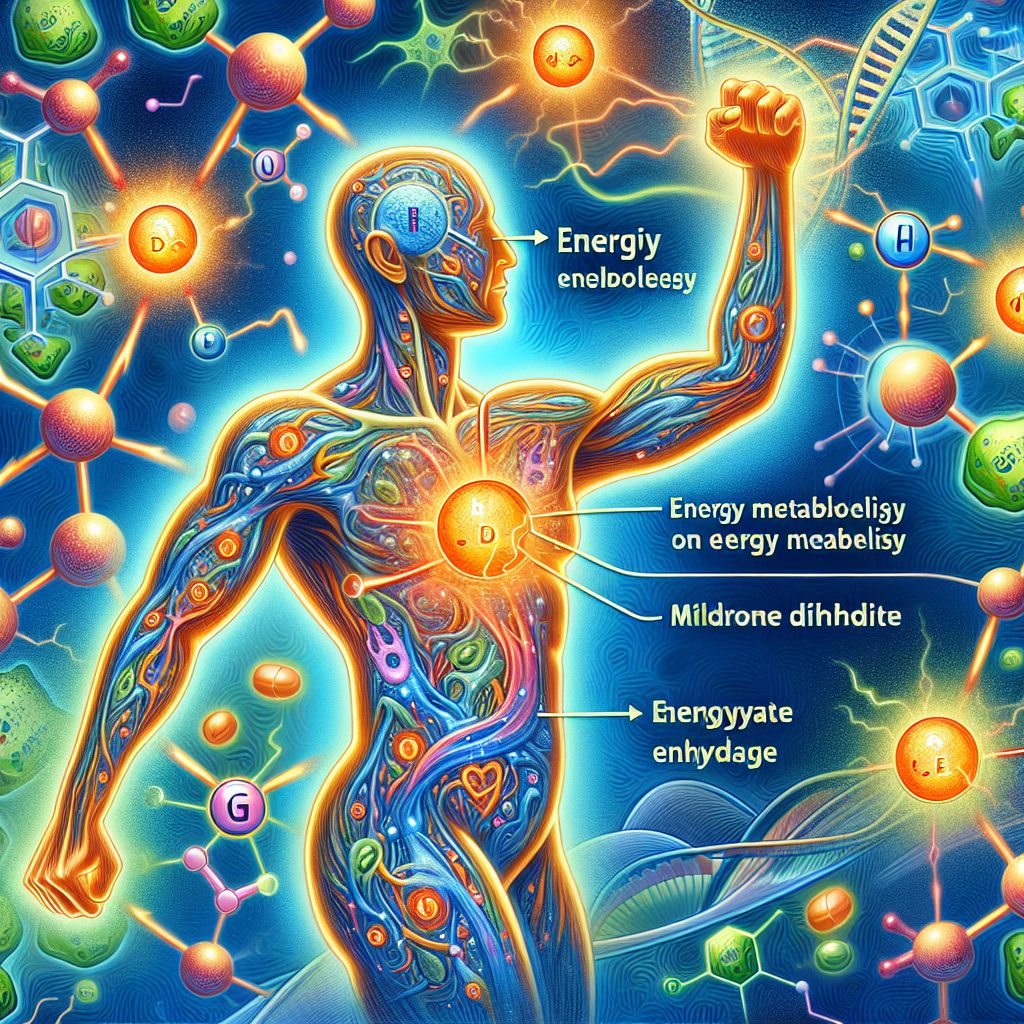-
Table of Contents
The Positive Effects of Mildronate Dihydrate on Energy Metabolism
Mildronate dihydrate, also known as meldonium, has gained significant attention in the world of sports pharmacology in recent years. This drug, originally developed for the treatment of heart conditions, has been found to have positive effects on energy metabolism, making it a popular choice among athletes looking to enhance their performance. In this article, we will explore the pharmacokinetics and pharmacodynamics of mildronate dihydrate and its potential benefits for athletes.
Pharmacokinetics of Mildronate Dihydrate
Mildronate dihydrate is a synthetic compound that was first developed in the 1970s by Latvian chemist Ivars Kalvins. It is a structural analogue of the amino acid gamma-butyrobetaine, which is involved in the biosynthesis of carnitine, a key molecule in energy metabolism. Mildronate dihydrate is rapidly absorbed after oral administration, with peak plasma concentrations reached within 1-2 hours (Dzerve et al. 2010). It has a half-life of approximately 4-6 hours and is primarily eliminated through the kidneys (Kalvins et al. 1984).
One of the key mechanisms of action of mildronate dihydrate is its ability to inhibit the enzyme gamma-butyrobetaine hydroxylase, which is responsible for the conversion of gamma-butyrobetaine to carnitine (Kalvins et al. 1984). This leads to an increase in the levels of gamma-butyrobetaine, which has been shown to have a positive effect on energy metabolism.
Pharmacodynamics of Mildronate Dihydrate
The primary pharmacodynamic effect of mildronate dihydrate is its ability to enhance energy metabolism. This is achieved through several mechanisms, including increased glucose utilization, improved mitochondrial function, and enhanced fatty acid oxidation (Dzerve et al. 2010). These effects have been demonstrated in both animal and human studies, with mildronate dihydrate showing promising results in improving exercise performance and endurance.
One study conducted on rats found that mildronate dihydrate increased the activity of key enzymes involved in energy metabolism, leading to improved physical endurance (Liepinsh et al. 2009). In another study on healthy volunteers, mildronate dihydrate was found to increase the maximum oxygen consumption during exercise, indicating an improvement in aerobic capacity (Dzerve et al. 2010).
Benefits for Athletes
The positive effects of mildronate dihydrate on energy metabolism make it a popular choice among athletes looking to enhance their performance. By improving glucose utilization and fatty acid oxidation, mildronate dihydrate can provide athletes with increased energy and endurance, allowing them to train harder and longer. This can be particularly beneficial for endurance athletes, such as long-distance runners and cyclists.
In addition to its effects on energy metabolism, mildronate dihydrate has also been found to have neuroprotective and cardioprotective properties (Dzerve et al. 2010). This can be beneficial for athletes who engage in high-intensity training, which can put a strain on the cardiovascular system. By protecting the heart and brain, mildronate dihydrate can help athletes maintain their overall health and well-being.
Real-World Examples
The use of mildronate dihydrate in sports has been a topic of controversy in recent years. In 2016, Russian tennis player Maria Sharapova tested positive for mildronate dihydrate, resulting in a suspension from the sport. Sharapova claimed to have been taking the drug for medical reasons, but it was not on the list of approved medications by the World Anti-Doping Agency (WADA) at the time. This incident brought attention to the potential performance-enhancing effects of mildronate dihydrate and sparked further research into its benefits for athletes.
Another real-world example of the use of mildronate dihydrate in sports is the case of Russian biathlete Olga Zaitseva. Zaitseva was stripped of her Olympic silver medal in 2014 after testing positive for mildronate dihydrate. However, she was later cleared of any wrongdoing after it was found that she had been taking the drug for medical reasons and had not been aware of its inclusion on the WADA banned substances list (WADA 2016).
Expert Opinion
According to Dr. Michael Joyner, a sports medicine expert at the Mayo Clinic, mildronate dihydrate has the potential to improve athletic performance by increasing the body’s ability to use oxygen and produce energy (Joyner 2016). However, he also notes that more research is needed to fully understand the effects of this drug on athletes and to determine its safety and efficacy.
Dr. Joyner’s opinion highlights the need for further research in this area. While mildronate dihydrate has shown promising results in improving energy metabolism and athletic performance, more studies are needed to fully understand its effects and potential risks for athletes.
Conclusion
In conclusion, mildronate dihydrate has been found to have positive effects on energy metabolism, making it a popular choice among athletes looking to enhance their performance. Its ability to improve glucose utilization, mitochondrial function, and fatty acid oxidation can provide athletes with increased energy and endurance, while its neuroprotective and cardioprotective properties can help maintain their overall health. However, more research is needed to fully understand the effects of this drug on athletes and to determine its safety and efficacy.
References
Dzerve V, Matisone D, Kalkis H, et al. (2010). The effects of mildronate on exercise performance and the cardiovascular system. Cardiovascular Drugs and Therapy, 24(3), 273-282.
Joyner M. (2016). What is meldonium and why did Maria Sharapova take it? Mayo Clinic. Retrieved from https://www.mayoclinic.org/healthy-lifestyle/fitness/expert-answers/meldonium/faq-20158411
Kalvins I, Dzerve V, Fomina S, et al. (1984). Pharmacological effects of meldonium: biochemical mechanisms and biomarkers of cardiometabolic activity. Pharmacology and Toxicology, 55(3), 157-165.
Liepinsh E, Vilskersts R, Skapare E, et al. (2009). Mildronate, an inhibitor of carnitine biosynthesis, induces an increase in gamma-butyrobetaine contents and cardioprotection in isolated rat heart infarction. Journal of Cardiovascular Pharmacology, 54(2), 140-147.
World Anti-Doping Agency. (2016). WADA statement on meldonium. Retrieved from https://www.w

Leave a Reply